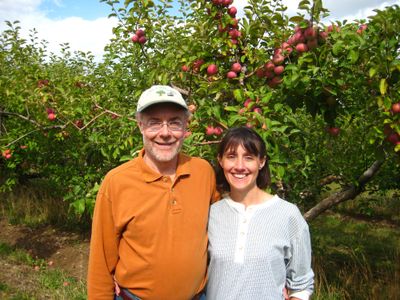Organic methods help trees thrive
Preventative therapy important part of maintaining Green Bluff orchard

This summer, I have been profiling local gardeners. When I heard that Cole’s Orchard in Green Bluff is the only certified organic orchard in Spokane County, I visited to learn about their methods.
Steve and Marie Cole have more than 1,000 apple, plum and apricot trees. As most gardeners are aware, fruit trees are challenging to grow organically because they are susceptible to pests and diseases.
To control apple codling moths, Steve Cole uses mating disruption techniques by hanging 1,600 dispensers of pheromones – chemicals that trigger mating responses in insects – in the tops of the trees throughout the orchard. This creates a cloud of pheromones, making it difficult for the male moths to find females.
To prevent “bitter pit” in apples, caused by a calcium deficiency, he sprays calcium on the trees. He controls apple scab by removing scabby leaves from the trees. He also uses lime sulfur in early spring to control scab and powdery mildew. Because apricots can attract earwigs, he spreads a sticky barrier called Tanglefoot on the trunks to prevent them from crawling into the trees. There are plenty of lady beetles, praying mantis and green lacewings on their property that help control harmful insects. The trees receive nutrients from cover crops such as clover that he tills under.
The Coles keep deer and elk out of the orchard with a 7-and-a-half-foot fence. “That fence is one of the best investments I’ve ever made,” Steve Cole says.
Each year, the Coles also sell organic tomatoes, sugar pumpkins, summer and winter squash, as well as lavender and sunflowers. They rotate their crops annually and use cover crops such as Australian winter peas and winter rye to add nitrogen to the soil and suppress weeds.
The tomato varieties they grow are Cougar Red, Siberia, Idagold and heirloom varieties Brandywine and Rocket. Steve Cole started tomatoes from seed in February, which turned out to be too early as they became quite leggy before they could be planted in the garden. “That was a good learning experience for me,” he admits, “and a mistake I don’t intend to repeat.”
“Winter squash are a huge sell-out every year,” Marie Cole said. They grow Sweet Meat, New England Blue Hubbard, Royal Acorn, Pink Banana, Delicata, Buttercup and spaghetti squash. To obtain good germination, they pre-sprout the seeds between layers of damp paper towels before planting them.
Knowing how to harvest and store winter squash can be tricky, but Marie Cole offers this advice: “Let the squash get lightly frosted, pick them with the stem on and let them cure for two to four weeks. Store them in a cool, dark place but don’t let them touch each other. They should last all winter.”
Steve and Marie Cole are both physical therapists.
“Just as we do for our patients, we practice preventive therapy out in the garden by trying to prevent problems and getting our plants healthy again,” Steve Cole says.
He believes having an orchard has been a rewarding experience.
“I’m a good example of someone who can become a farmer without any experience,” he said. “It’s been a big learning curve for me, but I’ve had a lot of support from other orchardists. I would encourage others to try it.”